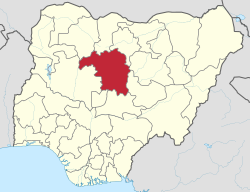
Back Kaduna (Agan̄-mkpulu) ANN كادونا (ولاية) Arabic Kaduna ştatı Azerbaijani کادونا ایالتی AZB Kaduna (stad) Breton Estat de Kaduna Catalan Kaduna State CEB Kaduna (delstat) Danish Kaduna (Bundesstaat) German Kaduna (subŝtato) Esperanto
Kaduna | |
|---|---|
| Nicknames: | |
 Location of Kaduna State in Nigeria | |
| Coordinates: 10°20′N 7°45′E / 10.333°N 7.750°E | |
| Country | |
| Date created | 27 May 1967 |
| Capital | Kaduna |
| Government | |
| • Body | Government of Kaduna State |
| • Governor[2] | Uba Sani (APC) |
| • Deputy Governor | Hadiza Sabuwa Balarabe |
| • Legislature | Kaduna State House of Assembly |
| • Chief Judge | Tukur Mu’azu |
| • National Assembly delegation | Senators:
Representatives: List |
| Area | |
• Total | 46,053 km2 (17,781 sq mi) |
| • Rank | 4th of 36 |
| Population (2006 census)1 | |
• Total | 6,113,503[1] |
• Estimate (2022[3]) | 9,032,200 |
| • Rank | 4th of 36 |
| GDP (PPP) | |
| • Year | 2021 |
| • Total | $27.88 billion[4] 11th of 36 |
| • Per capita | $2,905[4] 14th of 36 |
| Time zone | UTC+01 (WAT) |
| postal code | 8000014 |
| ISO 3166 code | NG-KD |
| HDI (2022) | 0.545[5] low · 24th of 37 |
| Website | kdsg |
Kaduna (Hausa: Jihar Kaduna, جىِهَر كَدُنا; مدينة كدونا; Fula: Leydi Kaduna, 𞤤𞤫𞤴𞤣𞤭 𞤳𞤢𞤣𞤵𞤲𞤢; Tyap: Si̱tet Ka̱duna) is a state in the northwest geopolitical zone of Nigeria. The state capital is its namesake, the city of Kaduna, which was the 8th largest city in the country as of 2006. Created in 1967 as North-Central State, which also encompassed the modern Katsina State, Kaduna State achieved its current borders in 1987. Kaduna State is the fourth largest and third most populous state in the country, Kaduna State is nicknamed the Centre of Learning, owing to the presence of numerous educational institutions of importance within the state such as Ahmadu Bello University[6], Nigerian Defence Academy, Air Force Institute of Technology (AFIT), Kaduna Polytechnic, etc.
Modern Kaduna State is home to the sites of some of Africa's oldest civilizations, including the Nok civilization that prospered from c. 1500 BC to c. 500 AD.[7][8] In the 9th century, geographer and historian Ya'qubi documented the existence of the Hausa Kingdoms, which existed until the region was incorporated into the Sokoto Caliphate in the early 1800s. During the colonial era, the city of Kaduna was made the capital of Northern Nigeria Protectorate by British leadership.
The state economy is dependent on agriculture, especially cotton and groundnut production.[6][9][10] In the modern era, Kaduna State has been the site of violent ethnic and religious conflict,[11] with the 2002 Miss World riots in the state capital over purported blasphemy leading to around 250 deaths and the loss of homes for around 30,000.[12]
- ^ "2006 PHC Priority Tables – NATIONAL POPULATION COMMISSION". population.gov.ng. Archived from the original on 10 October 2017. Retrieved 10 October 2017.
- ^ See List of governors of Kaduna State for a list of prior governors
- ^ "Kaduna State: Subdivision". www.citypopulation.de. Retrieved 7 February 2024.
- ^ a b Okeowo, Gabriel; Fatoba, Iyanuoluwa, eds. (13 October 2022). "State of States 2022 Edition" (PDF). Budgit.org. BudgIT. Retrieved 7 March 2023.
{{cite web}}: CS1 maint: date and year (link) - ^ "Sub-national HDI – Area Database – Global Data Lab". hdi.globaldatalab.org. Archived from the original on 23 September 2018. Retrieved 13 September 2018.
- ^ a b Cite error: The named reference
:1was invoked but never defined (see the help page). - ^ Breunig, Peter. 2014. Nok: African Sculpture in Archaeological Context: p. 21.
- ^ Fagg, Bernard. 1969. Recent work in west Africa: New light on the Nok culture. World Archaeology 1(1): 41–50.
- ^ Cite error: The named reference
:3was invoked but never defined (see the help page). - ^ Cite error: The named reference
:4was invoked but never defined (see the help page). - ^ "El-Rufai vows to restore Kaduna to its past glory". Vanguard News. 5 February 2021. Archived from the original on 16 February 2021. Retrieved 12 March 2021.
- ^ "The "Miss World Riots": Continued Impunity for Killings in Kaduna". Human Rights Watch. 23 July 2003. Archived from the original on 8 May 2020. Retrieved 7 April 2014.

